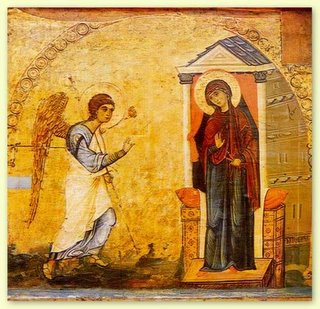A Committed Yes to God's Word.
 Today is Gaudete Sunday, the day when the Church lightens the shades of dusky violet allowing us a glimpse of the rose-coloured dawn of sunrise as the Sun of Justice draws nigh. Today, the heart of Israel and all who wait for the light of Christ skips a beat as the Virgin Daughter of Zion exults in her Saviour. Today - this blessed day that is between the feast of the Immaculate Conception and Our Lady's miraculous revelation of herself at Guadalupe - is pregnant with promise, hope and salvation. As such, our eyes turn to she who is the glory of Israel, the highest honour of our race; she, who is the figure of Advent and the source of our Christian hope, is also the model of Christian discipleship, of listening to God.
Today is Gaudete Sunday, the day when the Church lightens the shades of dusky violet allowing us a glimpse of the rose-coloured dawn of sunrise as the Sun of Justice draws nigh. Today, the heart of Israel and all who wait for the light of Christ skips a beat as the Virgin Daughter of Zion exults in her Saviour. Today - this blessed day that is between the feast of the Immaculate Conception and Our Lady's miraculous revelation of herself at Guadalupe - is pregnant with promise, hope and salvation. As such, our eyes turn to she who is the glory of Israel, the highest honour of our race; she, who is the figure of Advent and the source of our Christian hope, is also the model of Christian discipleship, of listening to God.Geoffrey Preston, OP in his book 'Hallowing the Time' which was edited posthumously by fr Aidan Nichols, OP has the following reflection for the Third Sunday of Advent (Year C) and addresses the question posed above. It speaks to us of commitment and fidelity, of discernment and vocation and ultimately of Our Lady's contemplation. As such I offer you fr Geoffrey's reflection that we may look to Mary and hear her eternal 'Fiat' and ponder with her what this means for all her children in the Church:
"The heart of Mary's common privilege, the moment that made her the perfect virgin daughter of Zion and so the first properly Christian believer, is her response of faith to the Angel. 'Be it done to me according to your word.' Extraordinary the gift of words... that words can throw a line over the future... A person can say, 'I will', taking account of what is not yet and covering it with his intent. This is what Mary does at the annunciation. She could not know what the future held, even though she knew who held the future... As Mary committed her future to the Word of God which Gabriel represents, so any one of us can commit himself to a lifetime with other particular persons who in turn commit themselves to him.
This kind of self-commital does not mean, of course, that all our problems are solved and all eventualities covered. Quite the opposite. If you promise to share a person's life and give him the right to share yours, then by that fact alone you have opened yourself to continual change. Mary put herself at the service of the Kingdom which was Jesus himself, the flesh-and-blood man from Nazareth. We put ourselves at the service of his kingdom, of Jesus as he comes to us in others, in our communities, and in the people we teach, or preach to, or care for. Such service as this depends on no force. It turns rather on a free agreement, on contracts, treaties, covenants, which leave life unpredictable in order that God's will may be done. And yet our promises and commitments to the Lord's will in saying that Marian 'Yes' create in our lives islands of certainty. Only we must not use these to imperialize the whole ground of the future, winning a path secure in all directions. That would defeat the whole enterprise. The security of commitment is not to make us less of a pilgrim, as Abraham, our father in faith, was a pilgrim, but more so.
By saying 'Yes' to God, 'Be it done to me according to your word!', we relinquish a certain control of our lives. The other person comes to us, and life itself henceforth comes to us, in such a way that we cannot twist away from it. Or at least we cannot if we hold to the commitment made and lived in the Yes that Mary said on behalf of all human nature. It brings suffering in the ancient sense of that word... and yet the pain is incidental to the acceptance, to the both-handed taking [of life]. We can have little idea where that will lead. In the nature of things we could not have, because we are involved in this with other people, who are themselves centres of freedom. Through these other people, loved, no doubt, but loved with both eyes open, God shapes our lives. We can only commit ourselves to God as we commit ourselves to other people, just as Mary committed herself both to Joseph and to the child she was conceiving. What comes of our lives is God's concern. All such living is not a career but a vocation. A career you carve out for yourself and busy yourself about, but a vocation you receive. It comes to you like life and as life... And all of this is what we should be learning when we contemplate Mary of Nazareth."







0 Comments:
Post a Comment
<< Home